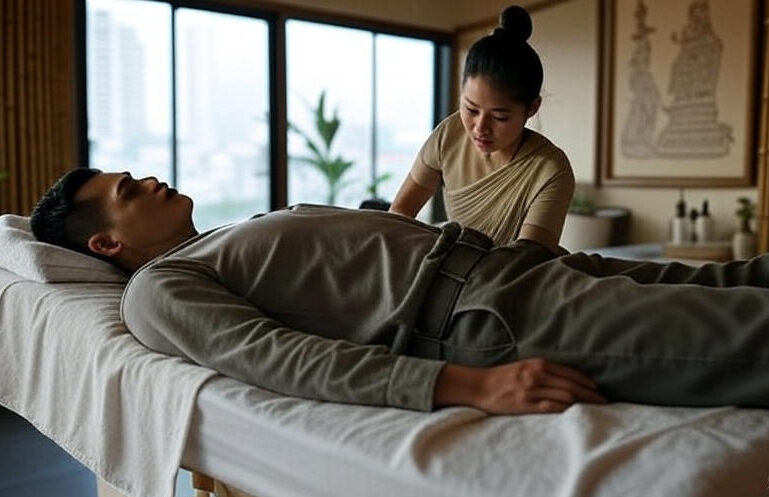
Military service demands peak physical and mental performance, often leaving soldiers with chronic pain, stress, and injuries. Massage therapy, particularly deep tissue and Thai massage, offers a promising solution for recovery. But could therapies from Bangkok, renowned for their unique blend of tradition and effectiveness, become a standard part of military rehabilitation programs worldwide? Let’s explore how these techniques support soldiers and whether they’re integrated into military wellness strategies, including by the Thai army and foreign forces.
Deep tissue massage targets muscle tension and scar tissue, common issues for soldiers after intense physical training or combat injuries. Its firm pressure breaks down adhesions, improves mobility, and reduces pain. Thai massage, with its stretching and acupressure techniques, enhances flexibility and promotes relaxation. In Bangkok, these therapies are widely accessible, with options like nuru massage in Bangkok gaining attention for their soothing effects. Research supports these benefits, showing massage reduces pain intensity and anxiety while improving sleep—critical for soldiers managing post-traumatic stress disorder (PTSD) or physical strain. A 2021 study found that veterans with combat injuries experienced meaningful relief from massage, highlighting its potential in recovery programs.
Why Massage Matters for Military Personnel
Soldiers face unique challenges. Physical injuries like low back pain or shoulder damage are prevalent, with studies indicating up to 70% of veterans suffer from musculoskeletal issues. Mental health struggles, including PTSD and anxiety, further complicate recovery. Massage therapy addresses both. For instance, a 2022 pilot study on female veterans showed effleurage massage reduced pain and anxiety during medical visits. The therapy’s ability to lower cortisol levels and boost serotonin and dopamine makes it a powerful tool for emotional and physical healing. Could this holistic approach reshape military health programs?
Thai Massage: A Unique Advantage
Thai massage stands out for its dynamic approach. Unlike Western styles, it combines stretching, rhythmic pressure, and energy line work, rooted in centuries-old traditions. A 2015 study from Thailand’s Mahidol University explored a mechanical model of Thai massage, noting its ability to mimic human touch effectively. Users reported high satisfaction, suggesting it could be standardized for broader use. The Thai army, known for integrating cultural practices, reportedly incorporates traditional massage into some rehabilitation protocols, though details are scarce. This raises a question: could foreign militaries adopt similar practices to enhance soldier recovery?
Global Military Adoption: What’s Happening?
In the U.S., the Department of Veterans Affairs (VA) has embraced massage therapy within its Whole Health program, recommending it for pain management and PTSD relief. A 2020 review confirmed massage’s efficacy for chronic low back and neck pain, conditions common among soldiers. However, access remains limited. Massage therapy codes are frequently documented in the Military Health System, but actual therapists are less common, often requiring referrals to specialized clinics. Other nations, like Canada and Australia, are exploring complementary therapies, but structured programs are rare. Thailand’s expertise in massage could offer a model, blending affordability with proven results.
Challenges to Standardization
Despite its benefits, integrating Bangkok-style therapies into military programs faces hurdles. First, there’s the issue of scalability. Training enough licensed therapists to serve large military populations is daunting. Second, cultural differences may affect acceptance. Thai massage’s hands-on, stretching-based approach might feel unfamiliar to some soldiers. Finally, funding and policy barriers persist. While the VA covers massage for some veterans, broader military adoption requires evidence-based protocols and budget allocation. Yet, the potential rewards—reduced opioid reliance, faster recovery, and improved mental health—make the effort worthwhile.
Bangkok’s Role in Military Wellness
Bangkok’s spa culture, including unique offerings like the Soapy Parlor in Bangkok, showcases a commitment to wellness that could inspire military programs. The city’s therapists are skilled in tailoring treatments to individual needs, a practice that aligns with personalized care models like the VA’s Whole Health initiative. Imagine soldiers accessing restorative therapies during or after deployment, reducing stress and enhancing readiness. Thailand’s affordability and expertise could even attract foreign militaries to collaborate on training or wellness retreats.
READ ALSO: Unwind and Relax with a Massage
Conclusion: A Path Forward?
Massage therapy, especially deep tissue and Thai massage, holds immense promise for military recovery. Its ability to address physical pain, mental stress, and sleep issues makes it a versatile tool. While the Thai army and some foreign programs incorporate elements of massage, standardization remains a distant goal. Bangkok’s therapies, with their rich tradition and proven efficacy, could guide the way. By investing in training, research, and policy changes, militaries worldwide might unlock a holistic approach to soldier wellness, ensuring those who serve return stronger—body and mind.
